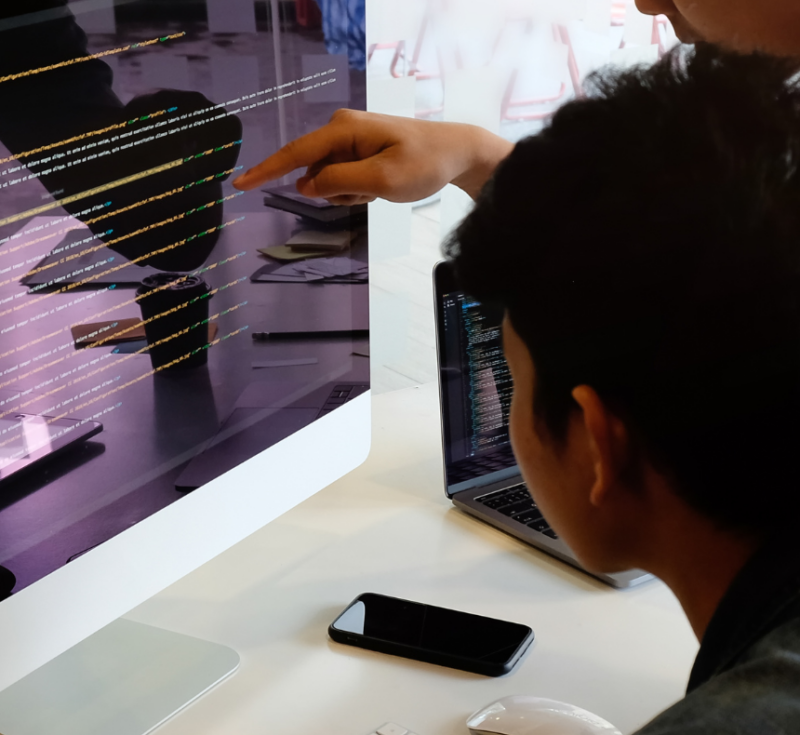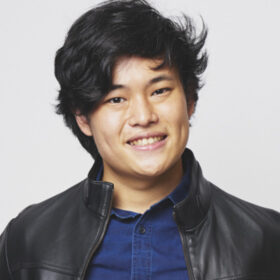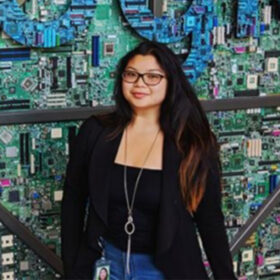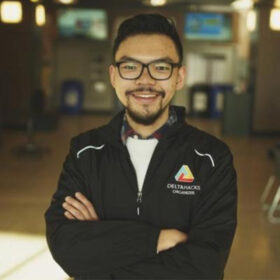Marketable skills
Our Computer Science program — tailored to a changing industry and world — gives you a competitive edge.
The curriculum, revamped in 2020, increases your co-op employability immediately following your first year.
In Level 2 and beyond, you can expect more technical electives are your fingertips, including machine learning, AI, medical imaging, security and data analytics.
- Introduction to Computational Thinking
- Introduction to Programming
- Practice and Experience: Development Basics
- Practice and Experience: Intro to Software Design Using Web Programming
- Discrete Math for Comp Sci
- 3 courses in calculus and linear algebra
- 2 open electives
- 4 computer science courses
- 2 logic and computability theory course
- 2 practice and experience courses
- 2 open electives
- 6 core computer science courses
- 6 technical electives
- 1 capstone course (full year)
- 6 open electives

Co-op opportunities
Expand your net worth and your network.
Every student has access to the co-op program. The best part? You decide when you would like to complete co-op and we’ll help you get there.
- Your professional career starts in your first year with an introductory non-credit co-op course.
- Throughout the year, a team of 15 staff from the Engineering Co-op and Career Services office connect with more than 1,000 employers, bringing them directly to you through over 200 workshops and events annually.
- We also work with you to help navigate the career exploration, job search, application, interview and offer process.
- Beginning as early as the summer after your first year, you can begin completing four-month co-op positions.
- After your third year, you’ll have the option to complete longer, more immersive eight-, 12- or 16-month positions.
Engineering and computer science co-op students undertake work terms with prestigious companies, including:
Aecon Group Inc., ArcelorMittal Dofasco, BlackBerry, Celestica, CIBC, Chrysler, Ford Canada, GE Canada, General Motors, Husky Injection Molding Systems, Hydro One, IBM Canada, John Deere, L-3 Wescam, Linamar Corporation, Maple Leaf Foods, Ontario Power Generation, Rockwell Automation, Stackpole International, Stem Cell Technologies, Suncor Energy, Toronto Hydro Corporation
Student life
Staying balanced. Keeping things in perspective. At Mac Eng, you’re always among friends – more than 6,000 of them!
Our #FireballFamily is a supportive community where students build each other up in a spirit of collaboration, not competition.
-

Ray, Computer Science, 2020 Grad
I was really into theatre in high school in Indonesia. When I came to McMaster and heard about the Engineering Musical, I was instantly excited. I was really nervous to audition, but once I started training with the group, it felt like I was part of the family. It’s a lot of work, but there is so much reward. I met most of my friends through the musical, and through the musical I met people who are part of other clubs. And through those people I met people from other clubs. So, it’s like you get this chain, this kind of web of people meeting each other and that makes for a really strong community.
-

Alyssia, Computer Science, 2019 Graduate
Some of my most memorable MacEng experiences are definitely starting and scaling DeltaHacks over five years, watching it grow and seeing incredible projects come out both as a director and a judge has been an amazing experience to be a part of. Teaching thousands of kids through McMaster Computer Science Outreach has been incredibly fulfilling. My first Welcome Week was definitely unforgettable — I met some of my best friends that week.
-

Troy, Computer Science, 2019 Graduate
Co-op put what I learned into practice. There’s always a disconnect between what you learn in school and what you learn in the real world. I understood concepts from class but didn’t have the practical skills. Co-op put them together. Now, I feel more comfortable graduating and finding a job [because] I have real work experience.
-
Frequently asked questions
First term: Python in COMPSCI 1MD3 and Haskell in COMPSCI 1JC3; second term: C and shell in COMPSCI 1XC3, and web programming in COMPSCI 1XD3.
More than 2/3 of students in the program graduate with co-op!
We have a flexible co-op option that allows for a range of work term lengths. Beginning as early as the summer after your first year, you can begin completing four-month co-op positions. After your third year, you’ll have the option to complete longer, more immersive eight-, 12- or 16-month positions.
For Computer Science, 77% of co-op work terms are 8-16 months long
Computer Science students have completed co-op positions in a variety of fields! Some of the most common include backend development, frontend development, full-stack, data analysis, data science, and AI-related roles. However, some students also complete project management, product development, research, and consulting positions.
McMaster Computer Science students have completed co-op for many employers, such as Microsoft, Google, Facebook, Twitter, Slack, Shopify, Amazon, and IBM, to name just a few! A number of students work with employers in the financial technology sector, including at companies such as RBC, Scotia, LoyaltyOne, and Clearnbanc. Additionally, Computer Science students have also worked with employers across the start-up ecosystem in Hamilton, Kitchener-Waterloo, Toronto, and Silicon Valley.
- Artificial Intelligence Society
- Computer Science Society
- Delta Hacks
- McMaster Competitive Programming
- McMaster Start Coding
- RoboMaster
- Sumobot
This varies from institution to institution. By being in the Faculty of Engineering, there are more opportunities for collaboration on industry projects with engineering applications.
In addition, there is a significant amount of cross-over in courses amongst CS, Software Engineering, and even Mechatronics Engineering within the Faculty.
If you are interested in the topics of Physics and Chemistry, you can definitely sign up for it. It would be educational and not cost you anything other than time. However, Chemistry and Physics will probably not help you directly in first year as you won’t be taking these courses as a Computer Science student.
Programming experience is not necessary for admission to the Engineering, BTech, or iBioMed programs. First year students take a computing course that specifically teaches you how to code in Python and is taught from the ground up (i.e. assuming you have no experience in this area). If you would like to get some practice in advance or are curious about coding, check out Codecademy, a site that teaches you how to code (for free!) in a variety of languages.



